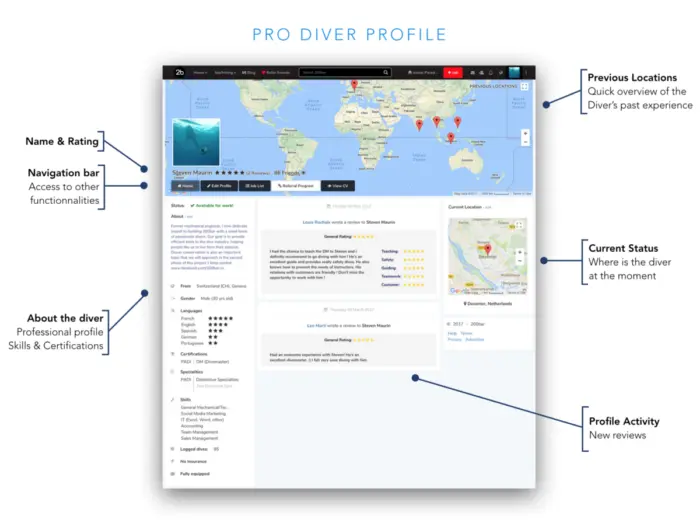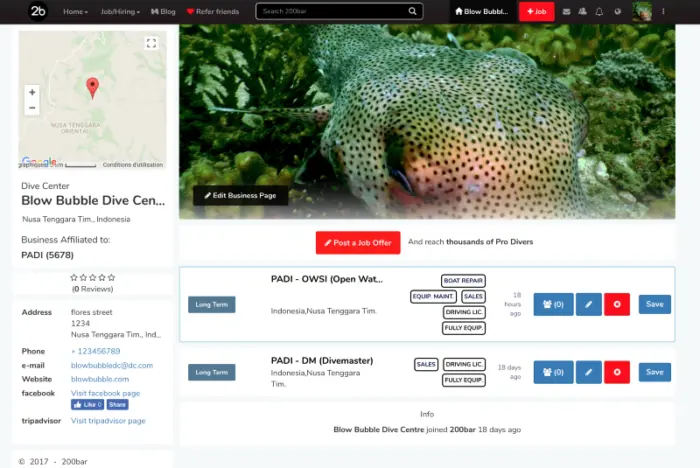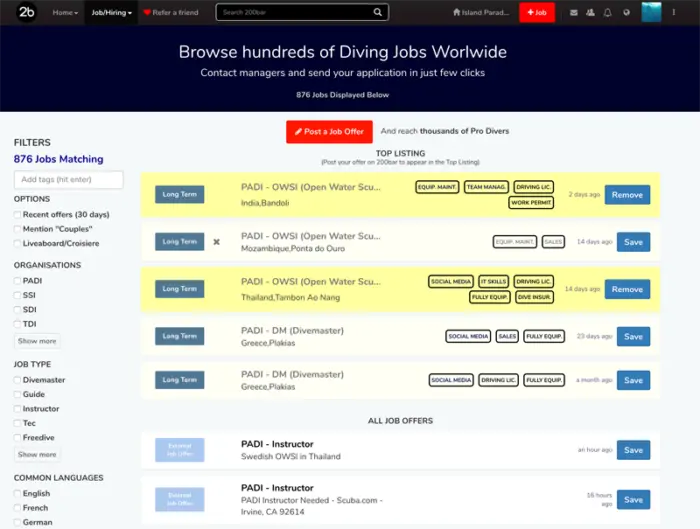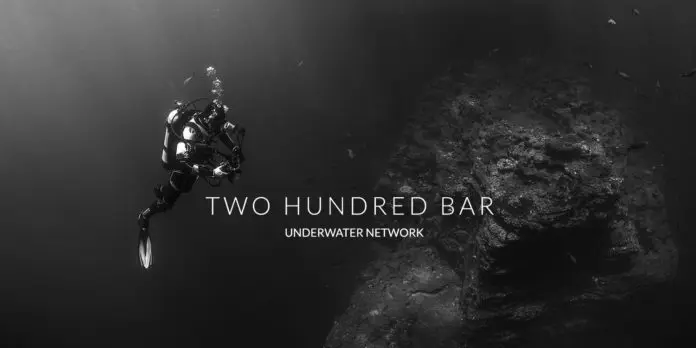Are you a dive professional looking for the next experience? Or a dive center needing to fill some vacated positions? Then 200bar might be what you are looking for.
One of the attractions of being a dive professional is to live and work in far off locations. I would even to willing to bet that most recreational dive professional have worked outside of their own country. Many of them likely in more than one country. As the saying goes, it goes with the territory. Exploring new opportunities, diving new locations it is in the blood. Finding those new opportunities, when you want one, that can be a challenge.
The Beginnings of 200bar
In November 2015, two friends Steven and Louis arrived in Koh Tao, Thailand looking for their next dream. Steven was there for training to become a dive master, he found that right away. Louis was an instructor, his luck was not as good. He looked online before arriving with no luck and when he was there it was dropping off CV at a never-ending number of dive shops.
There are a few websites that feature job postings for scuba professionals, some are good, others are not. I did a search for scuba diving jobs and came up with a number of websites with different focuses. One site said they had 120 jobs for scuba diving professionals. Over half were for divers to recover golf balls or remove weeds from lakes. Another dozen were really military recruitment ads. Out of the 120, only 5 were for scuba divers with a professional qualification. Another website had a fair number of job posting for dive masters and instructors. Some of the job postings were over 10 years old.
In business, you are often told the key to success is networking. Networking is often the key to getting ahead in your job, promotions, even being headhunted into a new better job. That is why websites like LinkedIn are so popular. The trials that Steven and Louis encountered lead them to believe that scuba diving professionals needed a network similar to what LinkedIn provides. That launched the concept that became 200bar. Launched in August of 2017, the website has recently added new features.
“We believe that the Dive Industry should embrace the digital era and take all the benefits it offers, starting by connecting Pro Divers and Dive Centers in a more reliable and efficient way.” – 200bar Vision Statement.
“To do so, 200bar provides Pro Divers with a full-featured job platform that aims to strengthen the divers’ community and improve the fluidity of information shared among professionals.” – 200bar mission statement.
Getting Started
The first step will be to register and create your professional diver profile. You provide your personal information and with a series of checkboxes and dropdowns present your accreditation and certifications. You have the option of adding your current location and places you have previously dived. Similar to LinkedIn and consumer travel places, your friends, previous students and business associates can add reviews. You have a link to upload a CV. You can select if you are available to consider a new position or not. Once your profile is complete, you can search for jobs and training then apply with just a click of a mouse.

A dive center manager, once they complete their professional diver profile, can create a business page for a dive center. Once the dive center business page is done the manager has three options. They can post a job opening, post a training opening or search for a diver.
Dive Center
When a dive center wants to publish a job, they fill in a form also with check boxes and drop downs. This allows you to should what basic qualifications you are looking for such as a PADI divemaster.
Add your job description and any other details you want to include and publish it when ready. The job will then appear on the job listing pages and will be searchable. It will also appear on your business page.

The training option is a new feature that is similar to the job listing. Here a dive center will post training programs that are available, such as zero to hero start dates, internships, and upcoming IDC classes.
A dive center can also search for divers who are registered, filtered by qualifications or skills they are looking for.
Diver Viewpoint
One a diver has completed his profile, they can search for a position or available training. Using check boxes, the diver can limit the search to different qualifications and locations. They can browse the resulting list and bring up any job that might interest him.

After looking over the job requirements, They can save it to his job list to return to later. The job listing will have a link to the business page of the dive center and at the bottom of the listing two buttons. One button is a chat button which will set up a live chat session, this will allow you to ask additional questions that you may have and introduce yourself. The other button is the CV button this allows you to apply for the job and send your CV.
introduce yourself. The other button is the CV button this allows you to apply for the job and send your CV.
Once you have sent in an application, you can see if there is a status on your job list.
My Viewpoint
Having dive resort and dive marketing experience, I walked through the process of setting up my professional profile. The process was very simple and only took a few minutes. I then added a few of the dive destinations I have experience with. Right now, my profile is active and 80% complete. I need to revise my CV before I upload it.
I searched the training programs and found a few internships that peaked my interest. Maybe something I might consider in the future. A general job search showed over 140 active jobs available.
From the business side, there are almost 5,000 registered dive professionals of which over 1,200 consider themselves available for work. That is an extensive labor market, just a click away.
Visit the website, start your own profile and maybe find that dream job you know is out there.
For the business owner needing staff, do not wait for word of mouth that you need help, post your requirements and also look who is available.

